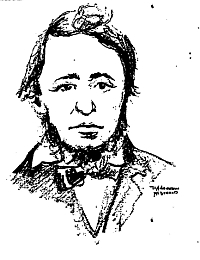A sermon by Rev Geof Usher. To introduce this talk, there are three readings.
EDWARD BEGAN TO SMILE
Moncure Daniel Conway, from Fredericksburg, Virginia, was one of the most dynamic Southern Unitarian ministers of the 19th century. He had early become enthralled with the ideas of Ralph Waldo Emerson, and, as a consequence, entered Harvard Divinity School to prepare for the Unitarian ministry. While at Harvard, he spent many enjoyable weekends at Concord with the Emersons and their friends. Here is one episode from Conway’s auto-biography. The date is 1853.
“I remember Ellen Emerson asking her father, ‘Whom shall we invite to the picnic?’ — his answer being, ‘All children from six to sixty.’ Then there were huckleberrying parties. These were under the guidance of Thoreau, because he alone knew the precise locality of every variety of the berry. I recall an occasion when little Edward Emerson, carrying a basket of fine huckleberries, had a fall and spilt them all. Great was his distress, and our offers of berries could not console him for the loss of those gathered by himself. But Thoreau came, put his arm around the troubled child, and explained to him that if the crop of huckleberries was to continue it was necessary that some should be scattered. Nature had provided that little boys should now and then stumble and sow the berries. We shall have a grand lot of bushes and berries in this spot, and we shall owe them to you. Edward began to smile.”
Then there were huckleberrying parties. These were under the guidance of Thoreau, because he alone knew the precise locality of every variety of the berry. I recall an occasion when little Edward Emerson, carrying a basket of fine huckleberries, had a fall and spilt them all. Great was his distress, and our offers of berries could not console him for the loss of those gathered by himself. But Thoreau came, put his arm around the troubled child, and explained to him that if the crop of huckleberries was to continue it was necessary that some should be scattered. Nature had provided that little boys should now and then stumble and sow the berries. We shall have a grand lot of bushes and berries in this spot, and we shall owe them to you. Edward began to smile.”
Key date: July 12, 1817: birth of Henry David Thoreau. Ref: Conway, Autobiography, I, p. 148.
A WORD ABOUT OUR FAITH by W G (Bert) Watson
Open-mindedness and tolerance sometimes suggest “easy come, easy go”, but we deny that Unitarianism should be an easy faith. Liberal religion forbids us to drift with the tide of popular opinion. For example, superficial appearances must be penetrated. Face values cannot be accepted.
Our world has too many people who are prepared to accept most of what they are taught without question. Education has not sufficiently encouraged the spirit of enquiry and effort to understand and rectify where needed. Most people are content with conformity. People reason that it pays off to think and act in the same way as those around us and thus avoid rough edges in our dealings with others. Life becomes shapeless in this way.
Unitarians base open-mindedness on the existence of a higher self within each individual rather than upon an external authority. The latter has only been elevated to supremacy when too much stress has been laid on human unworthiness.. Reliance on external power breaks down when people find that it does not carry them over life’s tragedies unscathed, and when things do not fit a pre-conceived pattern. Unitarians are ready to accept whatever comes to them, however unexpected or unwelcome. We try to school ourselves to see life as a kind of exploration, which sometimes leads to dead ends, but occasionally gives glimpses of a hidden grandeur beyond. We feel that there need not be a purpose in all life, and we are ready to accept what we cannot understand.
However, there is within us the power to change things, and to build on the experience which we gain. We believe that, in view of the potentialities which have come to fruition so remarkably in humankind’s development down the ages, we cannot regard the life process as doomed to perpetual frustration.
We cannot regard our fellow men and women as helpless and hopeless. There is power to break through, to higher things within each person. Liberal religion seeks to provide the incentive for all to make better use of these resources of heart, mind and body which are available.
This is why ours must always be a religion of purpose and effort, not an easy formless faith.
The third reading is a note about the style of Unitarian communities. ( click here for the full text).
The complete talk can be read by clicking here.
Leave a Reply